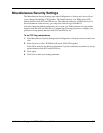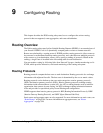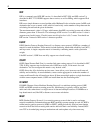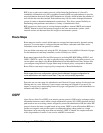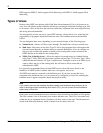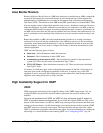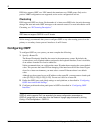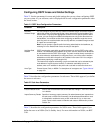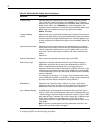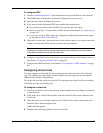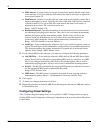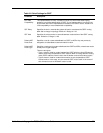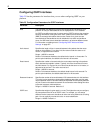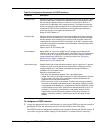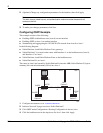
Nokia Network Voyager for IPSO 4.0 Reference Guide 357
Configuring OSPF Areas and Global Settings
Table 21 lists the parameters for areas and global settings that you use when configuring OSPF
on your system. As you add areas, each is displayed with its own configuration parameters under
the Areas section.
Table 22 describes the configuration parameters for stub areas. These fields appear if you define
the area as a stub area.
Table 23 describes the configuration parameters for NSSA areas. These fields appear if you
define the area as an NSSA (Not So Stubby Area). For more information on NSSA, see RFC
3101.
Table 21 OSPF Area Configuration Parameters
Parameter Description
Add New
Address Range
You can configure any area with any number of address ranges. Use these ranges to
reduce the number of routing entries that a given area emits into the backbone and
thus all areas. If a given prefix aggregates a number of more specific prefixes within
an area, you can configure an address that becomes the only prefix advertised into
the backbone. You must be careful when configuring an address range that covers
parts of a prefix not contained within the area. By definition, an address range consists
of a prefix and a mask length.
Note: You can prevent a specific prefix from being advertised into the backbone, by
selecting On in the Restrict field next to the entry for that prefix.
Add New Stub
Network
OSPF can advertise reachability to prefixes that are not running OSPF using a stub
network. The advertised prefix appears as an OSPF internal route and can be filtered
at area borders with the OSPF area ranges. The prefix must be directly reachable on
the router where the stub network is configured; that is, one of the router's interface
addresses must fall within the prefix to be included in the router-LSA. You configure
stub hosts by specifying a mask length of 32.
This feature also supports advertising a prefix and mask that can be activated by the
local address of a point-to-point interface. To advertise reachability to such an
address, enter an IP address for the prefix and a cost with a value other than zero.
Area Type Choose Normal, Stub, or NSSA. For descriptions of area types, see “Types of Areas”
on page 354.
Table 22 Stub Area Parameters
Parameter Description
Cost for Default Route Enter a cost for the default route to the stub area. Range: 1-16777215. There
is no default.
Import Summary Routes Specifies if summary routes (summary link advertisements) are imported into
the stub area or NSSA. Each summary link advertisement describes a route
to a destination outside the area, yet still inside the AS (i.e. an inter-area
route). These include routes to networks and routes to AS boundary routers.
Default: On.



